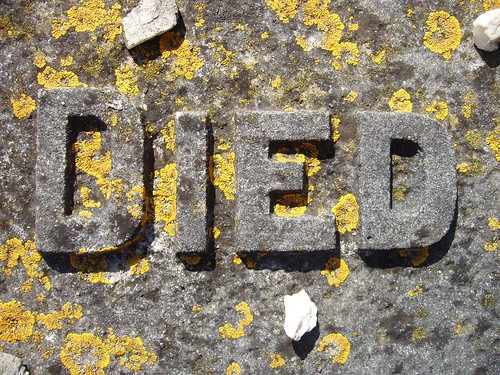
Steve jobs died.
It came as a shock to a large number of people. It shouldn't really have done this. We all know that he had cancer. He was diagnosed in 2003. He had a liver transplant a few years after that. He took a leave of absence to help deal with his illness. He came back to public life and shortly after that, in August this year, he stepped down completely from Apple retaining only the role of chairman. So we knew he was ill. We knew he was going to die. So when he died why was everybody so surprised?
I find it quite ironic that when Apple tries to release a new product, writers, bloggers, and the Tech media all want to find out as much as possible in advance and nothing comes as big surprise. However when the leader - a man who has been diagnosed with cancer, left, returned, and left again knowing he was going to die - does finally pass, it is a huge surprise.
Was it the fact he was young (55) ?
Cricketer Graham Dilly passed away the day before. He was in his 50's too. Actor Charles Napier passed away the same day. He was older (in his 70's)
Neither of them received the sort of public approbation that Jobs did (although, arguable, neither had left as impressive a legacy as Apple's leader). Maybe if they had died on a different day - one which was dominated by the death of such a technology titan - they might have been afforded more column inches.
More recently Tony Scott died. The nature of his death caused a lot of column inches (Can you recall the last major Hollywood A-list suicide?). But would we have been as shocked if he had died of natural causes at the age of 70+? A few weeks before Scott died, Anne Rutherford who starred in 'Gone With The Wind' died aged 94 and her passing was marked with only the merest of reporting. Both were individuals who were famous in their fields and yet the difference in coverage was amazing.
Neither of them received the sort of public approbation that Jobs did (although, arguable, neither had left as impressive a legacy as Apple's leader). Maybe if they had died on a different day - one which was dominated by the death of such a technology titan - they might have been afforded more column inches.
More recently Tony Scott died. The nature of his death caused a lot of column inches (Can you recall the last major Hollywood A-list suicide?). But would we have been as shocked if he had died of natural causes at the age of 70+? A few weeks before Scott died, Anne Rutherford who starred in 'Gone With The Wind' died aged 94 and her passing was marked with only the merest of reporting. Both were individuals who were famous in their fields and yet the difference in coverage was amazing.
What is it about dying young that makes it so much more shocking and unacceptable? The death of Princess Diana was an example. Millions of people who never met her, and knew her only from television news and tabloid stories, were moved to outpourings of grief. But when the Queen Mother - a venerable woman who lived well over 100 years - passed away a few years later, the grief was nowhere near as large. Presumably the grief is compounded by the age. A young (!) person passing unexpectedly from an accident or a disease is far more shocking than a centurion dying of old age. It's probably not even the age factor itself. After all writer Dennis Potter was only 59 when he died but he had been diagnosed with cancer (ironically pancreatic cancer - the same cancer that took Steve Jobs) and had made it clear to everyone that he was suffering from a terminal illness and that we should prepare for his passing
My favourite quote about Steve's death came from Robert Llewellyn, a British Actor who played Kryten in Red Dwarf and is now a committed environmentalist. He said:
"If your [sic] 18, 56 is truly ancient. If you [sic] 55 3/4 it's much much too young."
One more thing....
The final thought must - as always - go to Steve Jobs himself:
"Remembering that I'll be dead soon is the most important tool I've ever encountered to help me make the big choices in life. Because almost everything - all external expectations, all pride, all fear of embarrassment or failure - these things just fall away in the face of death, leaving what is truly important."


0 comments (See Policy http://tinyurl.com/5qgr5x):
Post a Comment